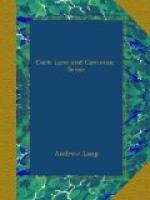So far it is plain that ‘what the ghost said is not evidence,’ and may even ruin a very fair case, for there can be little doubt as to who killed Serjeant Davies. But examples which Scott forgot, for of course he knew them, prove that, in earlier times, a ghost’s testimony was not contemned by English law. Cases are given, with extracts from documents, in a book so familiar to Sir Walter as Aubrey’s Miscellanies. Aubrey (b. 1626, d. 1697) was a F.R.S., and, like several other contemporary Fellows of the Royal Society, was a keen ghost hunter. He published {259} ’A full and true Relation of the Examination and Confession of William Barwick, and Edward Mangall, of two horrid murders’.
Barwick killed his wife, who was about to bear a child, near Cawood in Yorkshire, on April 14, 1690. Barwick had intrigued with his wife before marriage, and perhaps was ‘passing weary of her love’. On April 14, Palm Monday, he went to his brother-in-law, Thomas Lofthouse, near York, who had married Mrs. Barwick’s sister. He informed Lofthouse that he had taken Mrs. Barwick, for her confinement, to the house of his uncle, Harrison, in Selby. On September 17, at York assizes, Lofthouse swore that on Easter Tuesday (eight days after Palm Monday, namely April 22), he was watering a quickset hedge, at mid-day, when he saw ’the apparition in the shape of a woman walking before him’. She sat down opposite the pool whence he drew water, he passed her as he went, and, returning with his pail filled, saw her again. She was dandling on her lap some white object which he had not observed before. He emptied his pail, and, ‘standing in his yard’ looked for her again. She was no longer present. She wore a brown dress and a white hood, ’such as his wife’s sister usually wore, and her face looked extream pale, her teeth in sight, no gums appearing, her visage being like his wife’s sister’.
It certainly seems as if this resemblance was an after-thought of Lofthouse’s, for he dismissed the matter from his mind till prayers, when it ‘discomposed his devotions’. He then mentioned the affair to his wife, who inferred that her sister had met with foul play. On April 23, that is the day after the vision, he went to Selby, where Harrison denied all knowledge of Mrs. Barwick. On April 24, Lofthouse made a deposition to this effect before the mayor of York, but, in his published statement of that date, he only avers that ’hearing nothing of the said Barwick’s wife, he imagined Barwick had done her some mischief’. There is not a word hereof the phantasm sworn to by Lofthouse at the assizes on September 17. Nevertheless, on April 24, Barwick confessed to the mayor of York, that ’on Monday was seventh night’ (there seems to be an error here) he ’found the conveniency of a pond’ (as Aubrey puts it) ’adjoining to a quickwood hedge,’ and there drowned the woman, and buried her hard by. At the assizes, Barwick withdrew his confession, and pleaded ‘Not




